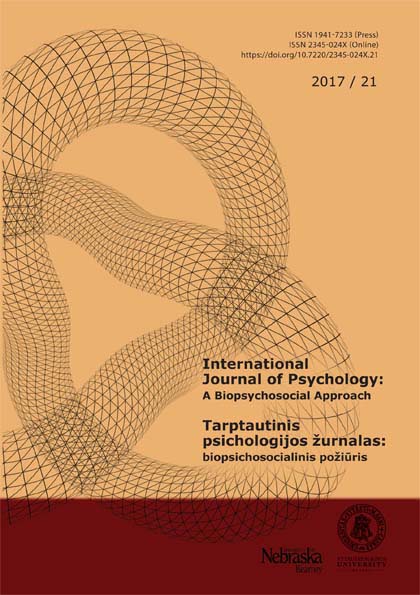Kaip emociniai, kognityviniai ir socialiniai sveikatos ištekliai susiję su sveikatai nepalankiu elgesiu? Lietuvos atvejis
How Do Emotional, Cognitive and Social Health Resources Relate to Health Behaviour? The Case of Lithuania
Author(s): Andrius Šmitas, Loreta GustainienėSubject(s): Social psychology and group interaction, Cognitive Psychology, Behaviorism, Health and medicine and law
Published by: Vytauto Didžiojo Universitetas
Keywords: Emotional; Cognitive; Social health resources; Health behaviour; Lithuania; European Social Survey;
Summary/Abstract: Introduction. In most research studies, health is analysed from the unidimensional perspective, e.g. medical studies are usually based on the biomedical model, which posits that health is an absence of illness, and that illness is caused by abnormality within the body. In this model, mental phenomena are not important, an individual has no or little responsibility on one’s health, and the treatment of a disease in most cases is passive (Wade, Halligan, 2004). The WHO (1948) definition of health suggests that health is not only the absence of illness, but also a good subjective and social state, i.e. health is a multidimensional, biopsychosocial construct. Therefore, alongside the analysis of the biological aspects of health, there is also a need to study the relationship between psychosocial aspects (resources) of health and health behaviour. The aim of the study is to explore the links between different emotional (feelings of depression, sadness, anxiety, happiness), cognitive (beliefs that other people are helpful, supportive, trustful) and social (religiousness, meeting with friends, participation in social activities, possibilities to discuss private, intimate questions) health resources and their relation to health behaviour (eating fruits, vegetables, smoking status, number of cigarettes, alcohol use frequency, amount of alcohol consumed on workdays and weekends, physical activity) in a representative sample of Lithuanian males and females. Research methods and participants. Single-item questions generated by experts from the European Social Survey round 7 were used to assess the emotional, cognitive and social health resources and health behaviour. The research sample (n=1865) was drawn from the general population in Lithuania (40.2 percent of males and 59.8 percent of females). The mean age of participants was 49.59 (SD=18.29). The youngest participant was 15 years old and the oldest one was 92. Participants were interviewed in 2014. The data was analyzed using Pearson’s correlation coefficient ρ. Statistical significance was set at p> .05. Results. In Lithuanian males, more frequent participation in social activities is connected to more frequent alcohol use and a greater amount of consumed alcohol, but it has no correlation with smoking or the number of cigarettes smoked. In Lithuanian females, more frequent participation in social activities is related to more frequent alcohol use and more frequent smoking, but it is not connected to the number of cigarettes smoked or the amount of consumed alcohol. The results of this study confirm that social environment might affect individual health behaviour not only positively, but also negatively. Discussion. It is evident that the levels of emotional and cognitive health among Lithuanian males and females are lower than in non-postsoviet (Scandinavian, Western Europe) countries (Smitas, Gustainiene, 2017). This data suggests that health behaviour may be negatively affected not only by personal (emotional and cognitive) health, but also by social aspects of health. There is a common misconception that more frequent participation in social activities positively affects a person’s health (Novek, Menec, Tran, Bell, 2013), however, our evidence suggests the opposite, i. e. in the case of men, more frequent participation in social activities results in more frequent alcohol use,while in the case of women, it results in more frequent cigarette smoking. Conclusions. More frequent participation in social activities by Lithuanian males is connected to more frequent alcohol use and more frequent smoking in Lithuanian females. Lower levels of emotional and cognitive health were also related to less favourable health behaviour. Further studies are needed to explore the links between social and behavioural health-related variables.
Journal: Tarptautinis psichologijos žurnalas: biopsichosocialinis požiūris
- Issue Year: 2017
- Issue No: 21
- Page Range: 57-70
- Page Count: 14
- Language: English

